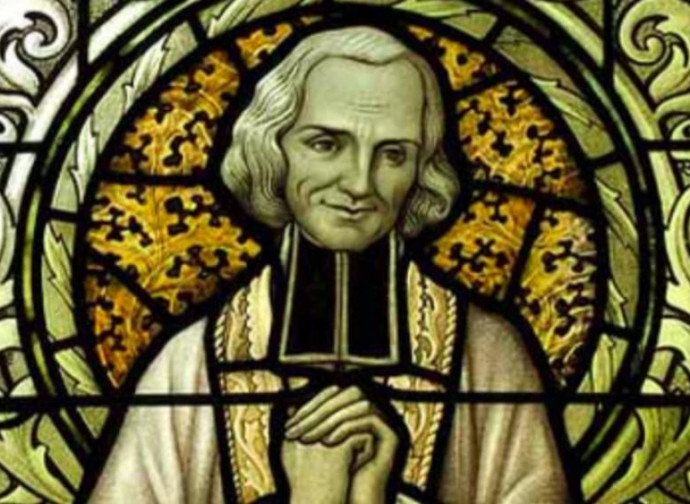Saint John Mary Vianney
Endless rows of penitents forced him to spend up to 16 hours a day in the confessional. He interrupted confessions only to celebrate Mass. The very way he celebrated Mass was the most powerful means of conversion

The first loves of Saint John Mary Vianney (1786-1859), known as the Curé d'Ars, were the Blessed Sacrament and Our Lady, whom “I loved even before I knew her. She is my oldest affection”. From Jesus and Mary he drew his vocation; the strength in his countless tribulations and labours before being ordained a priest; the charity with which for 41 years he paternally guided souls in the small parish of Ars, to the point of deserving to be proclaimed by Pius XI in 1929 patron saint of all parish priests. “The Priesthood is the love of Jesus' heart”, the saint said. He was extremely humble, but aware of the greatness of the priestly ministry, inseparable from Christ, the High Priest. “A good shepherd, a shepherd according to the heart of God, is the greatest treasure that the good God can grant to a parish and one of the most precious gifts of divine Mercy”.
Fourth of six children, he was born to two peasants in the French village of Dardilly. He was educated in Christian piety especially by his mother, who took him to Mass with her during the trying years of the Revolution. It was the time of the rift between the so-called juror priests, bent on Jacobin ideology, and the non-jurors or refractory priests, faithful to the Church at the cost of suffering persecution, first of all the removal from parishes by the revolutionaries. The priests were therefore often forced to celebrate the liturgy in barns and other makeshift places. It was in this climate that thirteen-year-old John, who had grown up very firmly in the faith, received First Holy Communion in the house of a widow. Already in his early childhood he had shown his ardour for God, teaching the basics of the catechism to his younger sister while grazing the flock and gathering to pray with other young shepherds.
First the financial difficulties of his father, then the enormous problems in learning Latin and other challenges delayed him on his way to the coveted priesthood. But Providence never abandoned him and he took strength from a good priest, Don Charles Balley (1751-1817), who died with a reputation for holiness and had been immediately struck by John's devotion. Don Balley was like a second father to him. He helped his spiritual son in his studies, prayed and did penance with him (both of them wore a cilice and surpassed each other in mortifications). On 13 August 1815 came the long-awaited day: John became a priest. He spent the first two years of his ministry at the side of Don Balley, as his parish vicar in Écully. It was he who gave the latter the last rites.
The saint was then entrusted with the chaplaincy of Ars, a village of just 230 souls with several taverns and a dance hall, which had corrupted the customs of the people. It was 9 February 1818 when he set out on his way to Ars, some thirty kilometres away. In a thick fog he asked a shepherd boy for directions. He thanked him thus: “You have shown me the way to Ars, I will teach you the way to Paradise”. As soon as he reached his destination, he knelt down to pray. He continued his prayer in the little church, invoking the guardian angel of the parish. Noting that religious ignorance reigned supreme, he began to devote himself to the Christian instruction of children. He was always jovial and at the same time rigorous in transmitting the teachings of the catechism. Several decades later his successors in Ars would testify, with admiration, that their elderly parishioners were very well versed in the truths of faith.
His work of moral reform among adults - with the inconvenient but necessary struggle against vices, which always had the salvation of souls as its goal - met with more resistance. Some of them tried to get him to leave the parish, but he did not take offence. He took solace in adoring the Blessed Sacrament, even gave beggars his clothes and the little fresh bread available. But between the voluntary privations and the torments inflicted on him by the devil it happened that “the good Lord gave me extraordinary graces”. Many of the faithful experienced an authentic renewal in spirit, guided by that singular shepherd who led them to love the Lord with tears in their eyes. Ars even became a pilgrimage destination during his earthly life.
Endless rows of penitents forced him to spend up to 16 hours a day in the confessional. “I weep because you do not weep,” he would say if he did not sense contrition in their hearts. Instead, he strengthened in hope sinners saddened by their own weaknesses, speaking to them sweetly of God's infinite goodness. He interrupted confessions only to celebrate Mass. The very way he celebrated Mass, identifying himself with Jesus' sacrifice on the cross, was the most powerful means of conversion, capable of moving the most lukewarm heart. “All good works gathered together are not equivalent to the sacrifice of the Mass, because those are the works of men, while the Holy Mass is God's work,” he taught. And he warned that the holiness of a priest depends entirely on the fervour with which he celebrates the Eucharistic mystery.
Learn more:
Benedict XVI's Letter proclaiming a Year for Priests on the 150th Anniversary of the Death of St. John Mary Vianney (2009)
